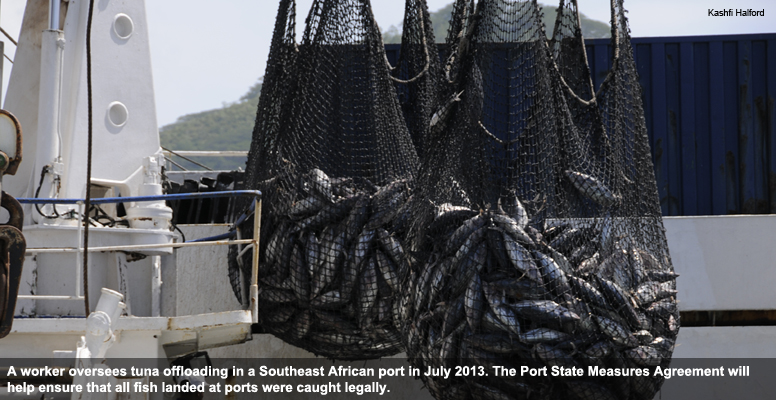Pew Praises Ratification of Treaty to Fight Illegal Fishing Worldwide
Port State Measures Agreement will strengthen inspection standards to keep illegally caught fish from reaching market
The United States Senate on April 3 took a strong stand in the global fight against illegal fishing by ratifying a treaty that will prevent illegally caught fish from entering the market through ports around the world. The treaty, called the Port State Measures Agreement, or PSMA, also would empower port officials to prohibit foreign vessels that are suspected of illegal activity from receiving port services and access. By cutting off market access for illegally caught fish, the treaty will erode the profit incentive that drives the activity.
The treaty, which the United Nations adopted in 2009, applies to foreign-flagged vessels calling on ports in any country that is a party to the agreement. Under its provisions, port officials who conclude that a vessel has a known or suspected record of illegal fishing would turn away the vessel or subject it to immediate inspection. If there is evidence of illegal catch, port officials would prohibit the landing of the catch. They also would alert other ports to the situation and could deny the vessel permission to refuel or receive repairs.
Tamera Luzzatto, senior vice president for government relations at The Pew Charitable Trusts, thanked the Senate Foreign Relations Committee, and especially Chairman Robert Menendez (D-NJ), ranking member Bob Corker (R-TN), Senator Ed Markey (D-MA), and Senator Marco Rubio (R-FL), for moving the PSMA through the Senate.
"By ratifying the PSMA, the United States is demonstrating our global commitment to legal and sustainable fisheries. This will encourage international cooperation to end illegal fishing in national waters and on the high seas worldwide," Luzzatto said. "Senators Menendez, Corker, Markey, and Rubio showed commendable bipartisan resolve in bringing this treaty to a vote. We now urge the House and Senate to pass the Pirate Fishing Elimination Act—the implementing language for the PSMA—to ensure that the agreement enters into force in a timely manner."

Worldwide, illegal and unreported fishing accounts for up to 26 million metric tons of fish annually, worth up to $23.5 billion. That equates to more than 1,800 pounds of wild-caught fish stolen from our seas every second. Reports from the U.S. State Department and the United Nations Office on Drugs and Crime note that many fishermen who engage in illegal fishing also commit other transnational crimes, including drug smuggling, human trafficking, and human rights abuses.
"The PSMA, once implemented widely, will be a cost-effective way to stop illegally caught fish from entering the market, turning this from a high-gain, low-risk activity into one in which the likelihood of being caught is a real and present danger and a major deterrent," said Tony Long, who directs Pew's project to end illegal fishing. "We are pleased that the United States, as one of the largest seafood markets in the world, is stating emphatically that illegally caught fish are not welcome in its ports."
The PSMA will take effect once 25 parties ratify it; the United States is the 11th party to do so, joining nine other countries and the European Union.






